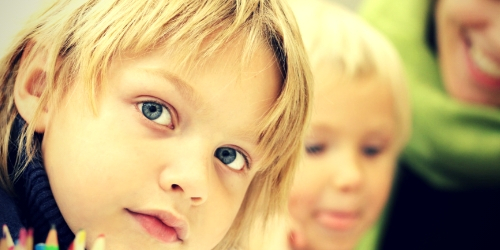Every parent wants their child to be able to play and engage with other children successfully, and every parent wants to help their child overcome the obstacles that are making peer play difficult for them.
To be able to help their child become more competent in peer play, parents need to learn some important things about peer play. Parents need to understand how competency in peer play develops, and they need to understand how to help their child develop the foundational skills that support peer play.
Peer Play and Improvisational Skill
Parents need to understand that peer play is very dependent on improvisational skill. Peer play is very dynamic and ‘in the moment’. It is very unplanned and spontaneous. Children do not think out their responses ahead of time, but rather create them ‘in the moment’.
To become an equal and competent partner in play, a child needs to be able to respond to the actions of a peer partner very quickly and in a very improvised and automatic manner.
A child, who is engaged in play with a peer, does not have the time to analyze and pre-consider their response or to think a long time about their contribution. They need to be able to contribute an idea of their own to the play very spontaneously.
To become an equal and competent partner in play a child must also understand that their idea has to ‘fit’ with and coordinate within the general scope of the activity. To prevent the play from becoming too chaotic and too disorganized, both partners must be familiar with the basic activity framework that supports the play, and both partners must not add ideas to play that break or lie too far outside the basic framework upon which the joint activity is based.
How Can Parents Help?
‘Improvisational’ skills: One Of The Foundational Skills That Supports Peer Play
Parents can help a child become more competent in peer play by helping their child develop the foundational skills that support successful peer play. Through engaging with their child in guiding frameworks that spotlight and support improvisational participation, a parent can help their child develop an ‘understanding’ of improvisation and experience what successful improvisation looks and feels like.
With the support of the guide, and through their participation in these very basic, joint co-regulatory frameworks, a child has an opportunity to learn about improvised thought and action and respond to others in an improvised manner. These frameworks help a child learn to develop thought and action synchrony in a competency based environment.
How Participation In These Activity Frameworks Develops The Child’s Ability To Spontaneously Synchronize
Before a child can improvise their role actions and add their own ideas to an activity in a coordinated manner, they need to be very knowledgeable about the frame of the activity and all it can entail. A child needs to understand what the goal of the activity is, feel confident in their ability to take on a role in that activity and be able to distinguish between central and peripheral activity variations.
 When the parent and child work side-by-side, the parent is able to help the child make sense of the activity and develop the comprehensive knowledge of the activity that improvisation requires. Through their active and successful participation in the activity under the parent’s guidance, the child learns how to respond to the actions of a partner in a coordinated manner. The parent gives the child an appropriate role in the activity and supports their ability to engage in coordinated role actions.
When the parent and child work side-by-side, the parent is able to help the child make sense of the activity and develop the comprehensive knowledge of the activity that improvisation requires. Through their active and successful participation in the activity under the parent’s guidance, the child learns how to respond to the actions of a partner in a coordinated manner. The parent gives the child an appropriate role in the activity and supports their ability to engage in coordinated role actions.
As the child develops competency and confidence the parent is able to deliberately, but thoughtfully, modify a familiar activity and introduce novelty and variation into the fundamental pattern of the activity. The framework allows the parent to deliberately vary their role actions or introduce minor variations into the activity that alter the activity without breaking the rules of the frame in a significant way. The parent can give the child different roles in the activity, model different role actions for the child and help the child understand that it is possible to change roles, introduce the child to activity variations and introduce new elements (characters or objects) into the activity.
Participating successfully in many similar but somewhat different activity frameworks helps a child acquire this very important type of activity knowledge. These framework or activity variations help a child become more comfortable with unpredictability. The child learns to expect some measure of unpredictability and become more competent in their ability to respond successfully to unpredictability. Through these actions, the parent is able to support the child’s ability to create and contribute their own ideas. The parent is able to support the child’s ability to contribute and improvise.
Successful participation in these activities help a child develop the comprehensive understanding of an activity that improvisation and spontaneity require.
When a child possesses comprehensive ‘expert’ knowledgeable about an activity framework they will be able to take greater initiative in the activity and it will be easier for them to successfully and competently add their own ideas to the activity. They will gradually be able to synchronize their actions with the actions of their parents partner in a more fluid and spontaneous manner. They will be able to improvise and respond in a more active and dynamic manner to the actions of a partner. They will be better able to improvise.
Successful participation in basic activity frameworks helps a child acquire this very important type of activity knowledge. This knowledge is crucial. It enables a child to participate more competently in the activity, increases their self-confidence and, most importantly, provides them with the knowledge they need to begin improvising and varying the activity themselves.
When a child can improvise they become ‘agentic’. They acquire personal power.
They are able to act more equally in an activity and as an equal partner in the activity, are able to play a role in determining what twists and turns the activity might possibly take.
Improvisational skill and feelings of personal agency support the development of successful and extended peer play. The ability to improvise supports a child’s ability to engage more spontaneously with a peer in play and the personal agency a child feels when they are able to co-direct the play motivates their interest and desire to engage in peer play.
Both of these important abilities, improvisational skill and agency, are developed when the child participates successfully with the parent in carefully constructed and guided co-regulatory activity frameworks.
